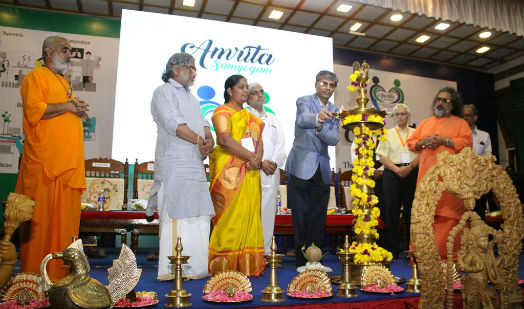Experts call for national policy on integrative medicine
Kochi: The Government needs to formulate a national policy on the integration of Ayurveda with allopathy so that India can take its rightful place as the global leader in integrative medicine, said experts assembled at India’s biggest conference on integrative Ayurveda and modern medicine at Kochi’s Amrita Institute of Medical Sciences. The two-day event called Amrita Samyogam, in which more than 60 experts and 1,000 delegates from around the world participated, was held in collaboration with Amrita University’s School of Ayurveda. It was inaugurated by Dr. Rajesh Kotecha, Special Secretary, Ministry of AYUSH.
The Conference brought together allopathic doctors, Ayurveda practitioners and modern scientists on a common platform to identify strategies for integrating Ayurveda with Allopathy in the management of cancer, auto-immune diseases like arthritis, diabetes, neuro-degenerative diseases, and mental health.
Speaking at the event, Shri Vaidya Rajesh Kotecha, Special Secretary, Ministry of AYUSH, said: “In integrative health, all streams of health sciences come together in a synergistic manner to positively impact health outcomes. The Government is very serious about promoting a model where experts in different domains contribute to the health science, and migration of knowledge occurs between each stream. Indian healing systems are holistic and intuitive – they cannot fully fit into all parameters demanded by Western medicine. The government is setting up a nationwide AYUSH grid connecting all hospitals and research labs to record case histories and observations so that a huge amount of evidences can be generated through data analytics about the efficacy of Ayurveda. While robust research is being conducted into Ayurveda, the problem arises in implementation of integrative medicine at the level of public health. This is because Ayurveda is still not accepted as a science by the Allopathic community. The Government of India has decided to extend its full support to Amrita University’s initiative on integrative medicine.”
Said Dr. P Ram Manohar, Research Director, Amrita Centre for Advanced Research in Ayurveda: “We have a pluralistic healthcare system which is officially promoted, but the irony is that there is no national policy for integrative medicine in the country. The thrust for such integration is currently coming from the patients, who are left to decide for themselves which system of medicine is best suited for them. This can be dangerous as most patients are not well-informed. The trend of integrative medicine is on the rise worldwide and India needs to emerge as the leader in the field. There is a need for practitioners of Ayurveda and allopathy to collaborate and work together as one multi-disciplinary team to deliver better healthcare. We need to develop integrated clinical trials and integrated practice guidelines for practitioners across different healthcare systems.”
Said Prof. Shantikumar Nair, Director, Centre for Nanosciences & Molecular Medicine, Amrita University: “Allopathic medicine has distinguished itself with molecular level diagnostics and therapy. However, in many chronic conditions like diabetes, arthritis and neurodegenerative and cardiovascular diseases, allopathic care does not promise cure. While disease management is possible with allopathic drugs, they have side-effects due to the use of synthetic elements. In Ayurveda, treatment is through natural herbal medications which can have significant potency and potential for substantial improvement in several disease conditions as well as less deleterious side effects. The main drawback of Ayurveda is the lack of scientific validation and data documentation as per evidence-based criteria, which prevents its better acceptance and recognition.”
Added Dr. Christian Kessler, Internal Medicine Specialist, Charite Medical University, Germany: “Ayurveda is a highly complex and whole medical system. Through its unique multi-modality therapeutic approach, it tackles issues related to health and disease at a systems level rather than unidimensional physical phenomena of single organs or cells. While modern biomedicine is currently rediscovering such inter-relationships in disciplines like psycho-neuro-immunology or psychosomatics, this has been at the heart of Ayurveda for thousands of years. Therefore, Ayurveda can be a great of source of inspiration for Western medicine, particularly in the emerging fields of personalized medicine, self-effectiveness and a strong emphasis on restoring health instead of focusing on disease only.”
The Conference focused on evidence-based practice guidelines for cross-referrals and combination therapy, understanding the biological mechanisms underlying integrative care, and integration of modern technological tools in Ayurvedic diagnostics, treatment procedures and drug delivery. An International Journal of Integrative Health was launched at the event and a Society for Integrative Health was established to promote the development of Integrative Medicine in India.
Eminent medical experts who attended the Conference included: Dr. Jeffrey White, Director of National Cancer Institute, USA; Dr. Daniel Furst, Rheumatologist at University of California; Dr. Nereo Bresolin, Neurologist, University of Milan; Dr. Christian Kessler, Internal Medicine Specialist, Charite Medical University, Germany; Dr. Valdis Pirags, Diabetologist, University of Latvia; Dr. Maryam Matar, Genetics Specialist, UAE; Dr. Ravi Mehrotra, Director, National Institute for Cancer Prevention and Research, Noida, Dr. B.N. Gangadhar, Director, NIMHANS, Bengaluru; Dr. Rama Jayasundar, Professor, All India Institute of Medical Sciences, New Delhi, Dr. Ketaki Bapat, Scientific Advisor to the Government of India, and many others.

